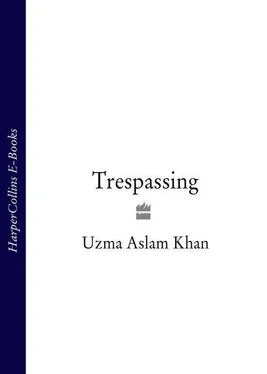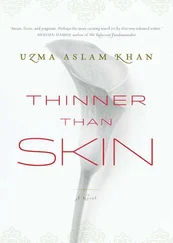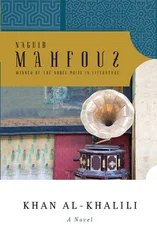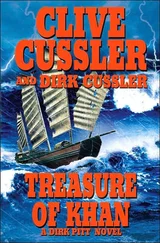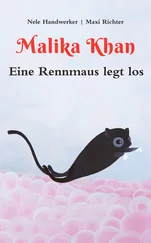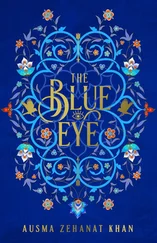Finally, they turned onto the National Highway. Salaamat again thought of his family. They were getting too close to the farm where his sister worked. He looked around him. Judging from the height of the sun, it was close to seven o’clock. They were near Keenjhar Lake; the farm was perhaps an hour away. Sumbul wouldn’t have arrived yet. He wished she had. What if their jeep intercepted her bus? He tried to remember which bus she took in from her husband’s house in the city, and what time it got to the farm. He realized he’d never asked her these basic questions. Now his mind swarmed with many others: if the men conducted raids this far south, who was to say she was safe, ever, not just today? And what about his brothers, Shan and Hamid, whom he always brushed by carelessly at the gate? And his father? Salaamat sighed with relief. The old man did not commute to the farm. He was safe.
It was the first time he’d thought of the old man with anything but disdain. What was happening to him? His stomach felt woozy. Liquid was floating in there. He squeezed his rectum and pressed a hand to his gut to stop the pain.
His thoughts returned to Sumbul. He saw her again with a baby suckling her Fanta-cap nipple. She looked beautifully up at him, the deep blue lapis lazuli stones as dazzling as her smile. He swallowed: what did the men do to the women and children on board the buses?
Fatah was still scowling at the naked riverbed. ‘It looks obscene,’ he declared.
‘What kind of vehicles get stopped?’ Salaamat tried.
‘Nice ones,’ Gharyaal Bhai flashed his teeth.
‘Not buses then?’
Someone else volunteered, ‘Depends.’
Fatah looked him full in the face. ‘You’ll do whatever’s expected.’
And then they turned west and Thatta flew by. They weren’t stopping. The arches of Shah Jehan’s Mosque receded like a massive ribcage: white bone after bone after bone.
But then there was a bus. It was heading toward them. They headed toward the bus.
Neither stopped.
Salaamat grew teary with relief.
They passed the farm. Inside, perhaps his brothers had already taken their place at the gate. He turned, but saw nothing — no shadows, no movement. Months later, when he saw it again, there’d be armed guards stationed there. But not today. Now they were entering the strip where his family commuted daily: between Makli Hill and Karachi. He could see the dome of the bat-infested tomb. Not long ago, he’d been witness to a secret tryst there. He carried that secret with him, down the National Highway, and the terror of intercepting Sumbul’s bus rose again. If anyone so much as laid a finger on her beautiful smile, he’d disembowel him.
He wanted to freeze time. Or maybe it was only in retrospect that he wished he’d wanted to. Later, he’d need to know if Fatah was right: who you are depends on where you are. So he observed the men the way he should have then. He went back to the jeep racing along at 110 kilometers an hour. He gave each man the attention he wished he’d given his brothers, sister, nephew, nieces, cousins, parents, grandparents, great-grandparents. He was never able to forget a single line on their faces.
Dil Haseen: the doolha with the deep, impassive voice, who joined the camp soon after his wedding. The men said he was too deadpan to consummate his marriage. No, he himself had said that.
Next to him was the baby-faced Gharyaal Bhai, always the first to volunteer for any expedition. Salaamat could see him with teeth bared, meeting a crocodile’s fangs with his own. Those teeth were going to stay far, far away from his family.
Ali, the malakhras wrestler. He still oiled himself every morning. He shared Salaamat’s tent and Gharyaal Bhai shared him.
Mirchi, small and eager to please. He hailed from Kunri, which gave the world more red chilies than any other place on earth.
Those were the four sitting opposite him. On his side, other than Fatah and himself, sat Yawar. Though zealous as Fatah, Fatah did not like Yawar because Yawar was the most educated man in the camp. He insisted Yawar was really a Muhajir spy in Sindhi skin.
And finally, the soldierly Amar. Broad-shouldered and sinewy like Salaamat, and just as quiet.
Ten, maybe twelve kilometers went by. They were approaching a village. Wheat and millet sprang around them and the trickle of irrigation canals was heavenly.
‘Let’s stop here,’ Ali suggested. ‘We can get a drink.’
‘No,’ Fatah shook his head. ‘We’re nearly there.’
At last the jeep came to a halt. ‘Park around the corner there,’ Fatah told the driver. ‘Come on,’ he said to Salaamat, and hopped outside.
They walked on the highway, eight men with two firearms each. Fatah positioned Salaamat in front of a wire fence enclosing a field of wheat dotted with egrets. ‘Right here?’ Salaamat protested. ‘In broad daylight?’
Dil Haseen extended a hand as if testing for raindrops. ‘Sun’s up.’
‘What do you mean in broad daylight?’ Fatah snarled. ‘It’s daytime isn’t it?’
‘Maybe he’s missing his blindfold,’ Yawar suggested.
‘Stay there,’ Fatah ordered. ‘The first vehicle you see, you stop.’ The other men crossed the street, leaving Salaamat alone to face oncoming traffic.
He had no watch, but it must have been after eight o’clock. His throat was so dry he could have sucked on a shoot of grass. In the distance, he saw farmers wandering about, and thought he even heard a goat bleat. Was he beginning to hallucinate? More than four hours without a drink, and with nothing in his stomach but a cup of feeble tea. The seven others stood across from him, maybe twenty feet away. They were haggard, humorless. They wanted nothing more than a cold shower, a hot meal and a soft bed. That ought to have been home. Instead, here they were, fighting for it on a sizzling day in June.
He began to see double. There were fourteen men across the street. There were two streets and there were four drops of sweat sliding all the way down his nose. When one drop struck his lips it was saltier than the godforsaken sea. He was ready to jump the fence and suck on anything, goat dung if he had to.
He heard a whistle. Someone waved from across both streets. It was Fatah, and he was excited. Salaamat knew why but he could not bring himself to look. Fatah whistled again, as if he had a bleating goat stuck inside him, the bastard. It was a dark car. Not a bus. Perhaps this wouldn’t be so bad after all. He couldn’t see the driver but the driver had seen them. About one hundred feet away the car stopped and began turning around.
‘Shoot!’ Fatah shouted.
Salaamat stared as the black car screeched and swiveled. The men had aimed their weapons and the driver panicked. He reversed into a ditch.
‘Shoot!’ Now the others were yelling too.
The engine roared. Tires pealed. The car was on the road again. In a few seconds, it would escape. Salaamat jogged towards it, holding up a pistol but doing nothing else.
‘Chootar,’ Fatah ran forward. ‘Fire!’
The air exploded in gunshots. At first Salaamat thought the shots had somehow turned to little flecks of light and the highway had shrunk into one of Hero’s magic vases. The glow was delicate, astral. Entirely at odds with the bellowing bullets. But then he saw it came from inside the car, or rather, around it. It was the windshield and the windows, and it sprayed the road in a light rain. Within seconds, the highway glittered like a forest of diamonds. When the men ran forward they crushed the diamonds to powder.
Fatah skidded up to the driver’s shattered window, dragging Salaamat with him. He kicked Salaamat’s shin. He tugged his locks. Salaamat fell in the powder laughing, ‘It’s not her bus!’
‘Stand up, cunt.’ Fatah kicked him again. ‘What do you think you’re trying to prove?’ Hauling him up, he kicked a third time. ‘When I say shoot, you shoot.’ This time he shoved him so hard Salaamat lunged forward, head and torso blasting into the broken window, hands flying up to break the momentum with the driver’s shoulders.
Читать дальше
Конец ознакомительного отрывка
Купить книгу
